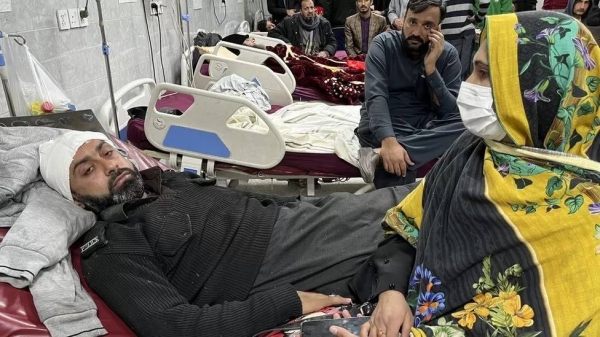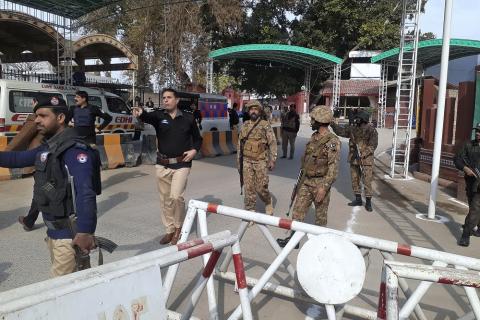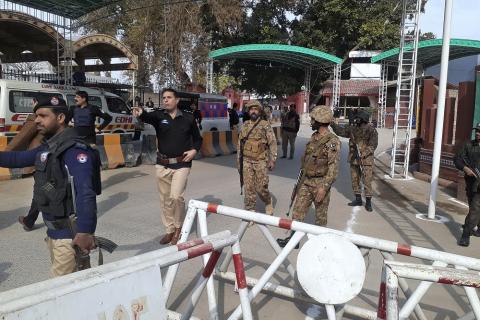
At least 61 people have been killed by a suicide bombing that apparently targeted policemen praying in a mosque in Peshawar, northwestern Pakistan.
"Terrorists want to create fear by targeting those who perform the duty of defending Pakistan," Prime Minister Shehbaz Sharif said. He added: "The entire nation is standing united against the menace of terrorism."
The Pakistani Taliban denied involvement after an initial claim by one of its commanders. The group ended a ceasefire in November, and violence has been on the rise since.
According to Peshawar Police Chief Mohammad Aijaz Khan, the death toll stood at 61, while 157 people had been injured.
Between 300 and 400 police officers were in the area at the time, Peshawar police chief Khan told local media.
In a statement to CNN, Khan earlier said the incident inside the Police Lines Mosque was “probably a suicide attack,” echoing Prime Minister Sharif.
“The brutal killing of Muslims prostrating before Allah is against the teachings of the Qur"an,” Sharif said in a statement, adding that “targeting the House of Allah is proof that the attackers have nothing to do with Islam.”
“Terrorists want to create fear by targeting those who perform the duty of defending Pakistan,” the prime minister continued.
“Those who fight against Pakistan will be erased from the page.”
A “comprehensive strategy” is in the works in order to restore law and order in the northwest Khyber Pakhtunkhwa province, where Peshawar is located, Sharif also said.
The mosque is in one of the most heavily controlled areas of the city, which includes police headquarters and intelligence and counter-terrorism bureaus.
The blast took place around 13:30 (08:30 GMT) during afternoon prayers in the north-western city, near the country"s border with Afghanistan.
A video circulating on social media and verified by the BBC shows that half of a wall caved in. The mosque was covered in bricks and debris as people clambered over the rubble to escape.
Hours after the blast, BBC News witnessed a facility full of the injured, many still wearing their police uniforms.
Some were covered in burns cream, their skin red with burns from the explosion. Others have broken bones from being hit by falling rubble.
One man said he still could not hear because of the sound of the blast. Another man said he had been rescued after being trapped under the rubble for almost an hour.
The prime minister traveled to Peshawar on an emergency visit, where he will be briefed by local officials and visit those wounded by the blast.
UN Secretary General António Guterres condemned the attack, with his spokeswoman saying: "It is particularly abhorrent that such an attack occurred at a place of worship."
The attack on the mosque took place at the start of a key week for Pakistani diplomacy.
On Monday, the president of the United Arab Emirates, Mohamed bin Zayed Al Nahyan, was due to visit Islamabad — although the trip was canceled at the last minute because of bad weather.
On Tuesday, an International Monetary Fund delegation is meant to visit Pakistan as part of the process to unlock a bailout loan to prevent the country from defaulting.
Last March, Peshawar was the target of another bombing, which killed dozens in a Shia Muslim mosque in the majority Sunni Muslim country.
In the capital Islamabad, police issued a high alert and said security at all entry and exit points to the city had been increased.
Siddique Khan, a police official, said the attacker blew himself up while among the worshippers. Authorities said 27 of the dead were police officials
Sarbakaf Mohmand, a commander for the Pakistan Taliban (Tehreek-e-Taliban, or TTP), initially claimed responsibility for the attack on Twitter.
But hours later, TTP spokesperson Mohammad Khurasani distanced the group from the bombing, saying it was not its policy to target mosques, seminaries and religious places. His did not address why a TTP commander had claimed responsibility for the bombing.
“Tehreek-e-Taliban has nothing to do with this attack,” a TTP statement said.
Former Pakistan Prime Minister Imran Khan took to Twitter to denounce the bombing.
“Strongly condemn the terrorist suicide attack in police lines mosque Peshawar during prayers,” he tweeted.
“It is imperative we improve our intelligence gathering and properly equip our police forces to combat the growing threat of terrorism.”
Peshawar, the capital of the Khyber Pakhtunkhwa province bordering Afghanistan, has experienced frequent attacks.
Last March, a suicide bomber targeted a mosque there, killing 64 in Pakistan’s deadliest attack since 2018. The Islamic State in Khorasan Province, ISKP (ISIS-K) claimed responsibility for the bombing.
Pakistan has seen a surge in violence during the last year, with numerous attacks on law enforcement officials, particularly in the Khyber Pakhtunkhwa province as well as the southern province of Balochistan.
In November last year, the TTP, which has been waging a rebellion against Pakistan for more than a decade, unilaterally ended a ceasefire with the Pakistani state.
In 2022 alone, Pakistan’s monitoring agencies recorded more than 150 attacks launched by the TTP – a group ideologically aligned with the Afghan Taliban – that struck across the country and killed dozens of people.
Authorities fear the return to power of the Taliban in Afghanistan has emboldened the TTP and led to its resurgence.
The group demands the imposition of their hardline interpretation of Islamic law, the release of their members arrested by the government, and a reversal of the merger of Pakistan’s tribal areas with Khyber Pakhtunkhwa province. — Agencies












